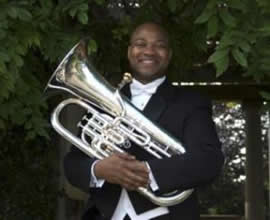Jazz is jazz and the classics, classics,
And never the twain shall meet.
But over the weekend of July 21-22, jazz and the classics experienced an encounter of a reasonably close kind, thanks to a fascinating and enlightening program offered by the Gary Motley Jazz Quartet, the Vega String Quartet, and pianist Will Ransom, who is also the Artistic Director of the presenter, the Highlands-Cashiers Chamber Music Festival. The program featured somewhat jazzy classics and other, generally sedate fare that might be seen as classic jazz. In more than a few respects it suggested the famous “third-stream” efforts of Gunther Schuller, the Modern Jazz Quartet, and others from a generation or so ago, when there was a belief that jazz and the classics might be merged to form a new stream of music – a third stream. It didn’t last, for reasons that cool-headed thinking people might have formulated at the time. Still, classical music has been influenced by jazz for a long time – there were samples of this during these concerts – and jazz has in turn been influenced by, among other things, the formal training and discipline that’s part and parcel of every hotshot classical virtuoso’s kit nowadays.
Cellist Guang Wang got things underway on July 22, in Cashiers, with two bourees from Bach’s C Major Suite – a very jazzy bit from long, long ago. This flowed handsomely into Claude Bolling’s “Baroque in Rhythm” (from the Suite for Cello and Jazz Piano Trio), for which Ransom, drummer Lorenzo Sanford, and bassist Moffett Morris joined the proceedings. Pianist Motley and his distinguished saxophonist Dwight Andrews then came on stage to team up with their quartet colleagues for the great Bud Powell number, “Tempus Fugit [fugue it…]”; this babe’s well over 50 years old now, so it’s definitely classic material.
The Vega Quartet demonstrated its considerable chops next with a fleet little Mozart quartet excerpt, the Presto from K.157. This is early Mozart, and it’s very lively, and it was radiantly played by Wang, violist Yinzi Kong, and violinists Wei Wei Lu and Jessica Shuang Wu, who’ve been working with Motley and his colleagues for several years. This fit better than one might have imagined with Fats Waller’s “Jitterbug Waltz,” which was brought to vivid life by the Motley ensemble, featuring smooth soprano sax lines and brilliant stride pianism.
Is blues jazz? Ravel’s Violin Sonata has a great little blues movement, and Wu played the dickens out of it, partnered by Ransom; the full house, in the Parish House of the Episcopal Church of the Good Shepherd, seemed especially taken with this score, which in truth is not heard as often as a lot of the composer’s other chamber music. The jazz group then wrapped up the first half with an astounding rendition of “I Loves you, Porgy,” from Gershwin’s Porgy and Bess, and a seasoned interpretation of “Just a Closer Walk” that illustrated and enlivened the old New Orleans traditions of call-and-response and the second line, when folks party down after funerals, celebrating the corpse’s release and transition to t’other side and the better life it promises.
That the Gary Motley Jazz Quartet is in tune with world events and humanity was underscored with its performance of Wayne Shorter and Herbie Hancock’s “Aung San Suu Kyi” – the title is the name of the long-suffering non-violent democratic activist from Myammar.
There was a jolt of sorts when Stravinsky’s angular Concertino erupted from the Vega’s instruments; this is not particularly user-friendly fare, although jazz influences on the Russian expatriate are manifest throughout it.
The grand finale was the premiere of the first movement of Gary Motley’s new suite – Suite Odyssey – that will be played in full on February 24, 2007, in Weill Recital Hall, the little gem of a chamber music venue in New York’s Carnegie Hall, in a program called – like this one in Cashiers – “Jazz Meets Classics.” It might be worth a trip, even from North Carolina, for in the short sample played, it is clear that Motley has achieved what few others have managed – he’s actually forged music that utilizes styles and techniques of both classical music and jazz, in the process coming up with an original and – at first hearing – impressive score that pleased and excited the audience. It was a splendid cap for an informative and often captivating concert, surely one of the most innovative programs of the Highlands-Cashiers Chamber Music Festival this season.
For remaining concerts being offered by HCCMF, see our Western calendar.











